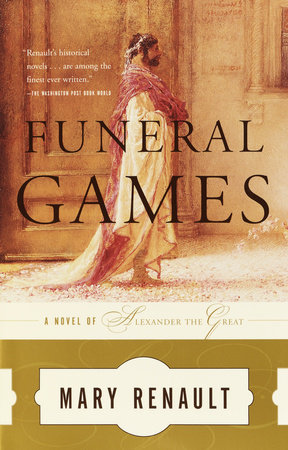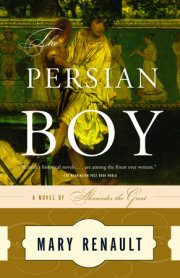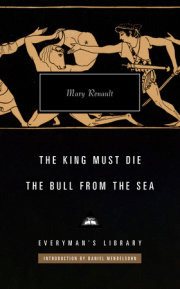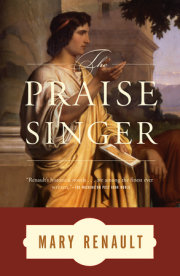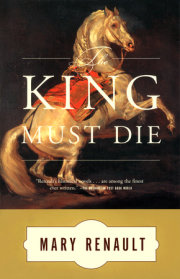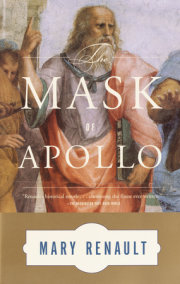323 B. C.
THE ZIGGURAT OF BEL-MARDUK had been half ruinous for a century and a half, ever since Xerxes had humbled the gods of rebellious Babylon. The edges of its terraces had crumbled in landslides of bitumen and baked brick; storks nested on its ragged top, which had once held the god's golden bedchamber and his sacred concubine in his golden bed. But this was only defacement; the ziggurat's huge bulk had defied destruction. The walls of the inner city by the Marduk Gate were three hundred feet high, but the ziggurat still towered over them.
Near by was the god's temple; this Xerxes' men had succeeded in half demolishing. The rest of the roof was patched with thatch, and propped on shafts of rough-hewn timber. At the inner end, where the columns were faced with splendid but chipped enamels, there was still a venerable gloom, a smell of incense and burnt offerings. On an altar of porphyry, under a smoke-duct open to the sky, burned in its bronze basket the sacred fire. It was low; the fuel-box was empty. Its shaven acolyte looked from it to the priest. Abstracted though he was, it caught his eye.
"Fetch fuel. What are you about? Must a king die when it serves your laziness? Move! You were got when your mother was asleep and snoring."
The acolyte made a sketchy obeisance; the temple discipline was not strict.
The priest said, after him, "It will not be yet. Maybe not even today. He is tough as a mountain lion, he will die hard."
Two tall shadows fell at the temple's open end. The priests who entered wore the high felt miters of Chaldeans. They approached the altar with ritual gestures, bowing with hand on mouth.
The priest of Marduk said, "Nothing yet?"
"No," said the first Chaldean. "But it will be soon. He cannot speak; indeed he can scarcely breathe. But when his homeland soldiers made a clamor at the doors, demanding to see him, he had them all admitted. Not the commanders; they were there already. The spear-bearers, the common foot-men. They were half the morning passing through his bedchamber, and he greeted them all by signs. That finished him, and now he is in the death-sleep."
A door behind the altar opened to let in two Marduk priests. It gave a glimpse of a rich interior; embroidered hangings, a gleam of gold. There was a smell of spiced meats cooking. The door closed on it.
The Chaldeans, reminded of an old scandal, exchanged glances. One of them said, "We did our best to turn him from the city. But he had heard that the temple had not been restored; and he thought we were afraid of him."
A Marduk priest said stiffly, "The year has not been auspicious for great works. Nebuchadrezzar built in an inauspicious year. His foreign slaves rioted race against race, and threw each other off the tower. As for Sikandar, he would still be fortunate, sitting safe in Susa, if he had not defied the god."
One of the Chaldeans said, "It seems to me he did well enough by the god, for all that he called him Herakles." He looked round, pointedly, at the half-ruined building. He might as well have said aloud, "Where is the gold the King gave you to rebuild, have you eaten and drunk it all?"
There was a hostile silence. The chief of the Marduk priests said, with emollient dignity, "Certainly you gave him a true prediction. And since then have you read the heavens?"
The tall miters bent together in slow assent. The oldest Chaldean, whose beard was silver against his dark face and purple robe, signed to the Marduk priest, beckoning him to the broken end of the temple. "This," he said, "is what is foretold for Babylon." He swept round his gold-starred wand, taking in the crumbling walls, the threadbare roof, the leaning timber-props, the fire-stained paving. "This for a while, and then . . . Babylon was."
He walked towards the entry and stood to listen; but the night noises were unchanged. "The heavens say it begins with the death of the King."
The priest remembered the shining youth who, eight years before, had come offering treasure and Arabian incense; and the man who had returned this year, weathered and scarred, the red-gold hair sun-bleached and streaked with white; but with the deep eyes still burning, still ready with the careless, reflex charm of the youth beloved, still terrible in anger. The scent of the incense had lasted long on the air, the gold much longer in the treasury; even among men who liked good living, half was in the strongroom still. But for the priest of Bel-Marduk the pleasure had drained out of it. It spoke now of flames and blood. His spirit sank like the altar fire when the fuel was low.
"Shall we see it? Will a new Xerxes come?"
The Chaldean shook his head. "A dying, not a killing. Another city will rise and ours will wane. It is under the sign of the King."
"What? Will he live, then, after all?"
"He is dying, as I told you. But his sign is walking along the constellations, further than we can reckon in years. You will not see it setting in your day."
"So? Well, in his life he did us no harm. Maybe he will spare us dead."
The astrologer frowned to himself, like an adult seeking words to reach a child. "Remember, last year, the fire that fell from heaven. We heard where it fell, and went there, a week's journey. It had lit the city brighter than full moon. But we found, where it had struck, it had broken into red-hot embers, which had charred the earth around them. One had been set up by a farmer in his house, because that day his wife bore twin sons. But a neighbor had stolen it for its power; they fought, and both men died. Another piece fell at a dumb child's feet, and speech came back to him. A third had kindled a fire that destroyed a forest. But the Magus of the place had taken the greatest piece, and built it into the fire-altar, because of its great light while it was in the sky. And all this from the one star. So it will be."
The priest bowed his head. A fragrance drifted to him from the precinct's kitchen. Better to invite the Chaldeans than let the meat spoil with waiting. Whatever the stars said, good food was good food.
The old Chaldean said, looking into the shadows, "Here where we stand, the leopard will rear her young.
The priest made a decent pause. No sound from the royal palace. With luck, they might get something to eat before they heard the wailing.
The walls of Nebuchadrezzar's palace were four feet thick, and faced with blue-glazed tiles for coolness; but the midsummer heat seeped in through everything. The sweat running down Eumenes' wrist blotted the ink on his papyrus. The wax glistened moistly on the tablet he was fair-copying; he plunged it back into the cold-water tub where his clerk had left it, with the other drafts, to keep the surface set. Local scribes used wet clay; but that would have set hard before one could revise on it. For the third time he went to the doorway, seeking a slave to pull the punkah cord. Once again the dim hushed noises--soft feet, soft voices furtive or awed or grieving--sent him back behind the drawn door-curtain to his listless task. To clap the hands, to call, to shout an order, were all unthinkable.
He had not sought his clerk, a garrulous man; but he could have done with the silent slave and the waft of the punkah. He scanned the unfinished scroll pinned to his writing-board. It was twenty years since he had written with his own hand any letter not of high secrecy; why now was he writing one that would never go, short of a miracle? There had been many miracles; but, surely, not now. It was something to do, it shut out the unknown future. Sitting down again he retrieved the tablet, propped it, dried his hand on the towel the clerk had left, and picked up his pen.
And the ships commanded by Niarchos will muster at the river-mouth, where I shall review them while Perdikkas is bringing the army down from Babylon; and sacrifices will be made there to the appropriate gods. I shall then take command of the land force and begin the march to the west. The first stage . . .
When he was five, before he'd been taught to write, he came to me in the King's business room. "What's that, Eumenes?" "A letter." "What's the first word that you've written big?" "Your father's name. PHILIP, King of the Macedonians. Now I'm busy, run back to your play." "Make me my name. Do, dear Eumenes. Please." I gave it him written, on the back of a spoiled despatch. Next day he'd learned it, and carved it all over the wax for a royal letter to Kersobleptes of Thrace. He had my ruler across his palm . . .
Because of the heat he had left open his massive door. A brisk stride, half hushed like all other sounds, approached it. Ptolemy pushed aside the curtain and drew it to behind him. His craggy war-weathered face was creased with fatigue; he had been up all night, without the stimulus of action. He was forty-three, and looked older. Eumenes waited, wordlessly.
"He has given his ring to Perdikkas," Ptolemy said.
There was a pause. Eumenes' alert Greek face--not a bookish one, he had had his share of soldiering--searched the impassive Macedonian's. "For what? As deputy? Or as Regent?"
"Since he could not speak," said Ptolemy drily, "we shall never know."
"If he has accepted death," Eumenes reasoned, "we may presume the second. If not . . . ?
"It's all one, now. He neither sees nor hears. He is in the death-sleep."
"Do not be sure. I have heard of men who were thought already dead, and who said later that they heard everything."
Ptolemy suppressed an impatient gesture. These wordy Greeks. Or what is he afraid of? "I came because you and I have known him since he was born. Don't you want to be there?"
"Do the Macedonians want me there?" An ancient bitterness pinched, for a moment, Eumenes' mouth.
"Oh, come. Everyone trusts you. We shall need you before long."
Slowly the Secretary began to put his desk in order. He said, wiping his pen, "And nothing, to the last, about an heir?"
"Perdikkas asked him, while he could still get a whisper out. He only said, 'To the best man. Hoti to kratisto.' "
Eumenes thought, They say dying men can prophesy. He shivered.
"Or," Ptolemy added, "so Perdikkas told us. He was leaning over. Nobody else could hear."
Eumenes put down the pen and looked up sharply. "Or Kratero? You say he whispered, he was short of breath." They looked at one another. Krateros, the highest-ranking of all Alexander's staff, was on the march to Macedon, to take over the regency from Antipatros. "If he'd been in the room . . . "
Ptolemy shrugged. "Who knows?" To himself he thought, If Hephaistion had been there . . . But if he'd lived, none of this would have happened. He'd have done none of the crazy things he's dying of. Coming to Babylon in midsummer--boating about in the filthy swamps down river . . . But one did not discuss Hephaistion with Eumenes. "This door weighs like an elephant. Do you want it shut?"
Pausing on the threshold, Eumenes said, "Nothing about Roxane and the child? Nothing?"
"Four months to go. And what if it's a girl?"
They moved into the shadowy corridor, tall big-boned Macedonian and slender Greek. A young Macedonian officer came blundering towards them, almost ran into Ptolemy, and stammered an apology. Ptolemy said, "Is there any change?"
"No, sir, I don't think so." He swallowed violently; they saw that he was crying.
When he had gone, Ptolemy said, "That boy believes in it. I can't yet."
"Well, let us go."
"Wait." Ptolemy took his arm, led him back into the room, and dragged-to the great ebony door on its groaning hinges. "I'd best tell you this while we've time. You should have known before, but . . ."
"Yes, yes?" said Eumenes impatiently. He had quarreled with Hephaistion shortly before he died, and Alexander had never been easy with him since.
Ptolemy said, "Stateira is pregnant, too."
Eumenes, who had been fidgeting to be gone, was struck into stillness. "You mean Darius' daughter?"
"Who else do you suppose? She is Alexander's wife."
"But this changes everything. When did . . . ?"
"Don't you remember? No, of course, you'd gone on to Babylon. When he came to himself after Hephaistion died" (one could not avoid the name forever) "he went to war with the Kossaians. My doing; I told him they'd demanded road-toll, and got him angry. He needed to be doing something. It did him good. When he'd dealt with them, and was heading here, he stopped a week at Susa, to call upon Sisygambis."
"That old witch," said Eumenes bitterly. But for her, he thought, the King's friends would never have been saddled with Persian wives. The mass wedding at Susa had gone by like some drama of superhuman magnificence, till suddenly he had found himself alone in a scented pavilion, in bed with a Persian noblewoman whose unguents repelled him, and whose only Greek consisted of "Greeting, my lord."
"A great lady," said Ptolemy. "A pity his mother was not like her. She would have had him married before he set out from Macedon, and seen that he got a son. He could have had an heir of fourteen by this time. She'd not have sickened him with marriage while he was a child. Whose fault was it that he wasn't ready for a woman till he met the Bactrian?" Thus, unofficially, did most Macedonians refer to Roxane.
"Done is done. But Stateira . . . Does Perdikkas know?"
"That's why he asked him to name his heir."
"And still he would not?"
" 'To the best,' he said. He left it to us, to the Macedonians, to choose when they came of age. Yes, he's a Macedonian at the last."
"If they are boys," Eumenes reminded him.
Ptolemy, who had been withdrawn into his thought, said, "And if they come of age."
Eumenes said nothing. They went down the dim corridor with its blue-tiled walls towards the death-chamber.
Copyright © 2002 by Mary Renault. All rights reserved. No part of this excerpt may be reproduced or reprinted without permission in writing from the publisher.

